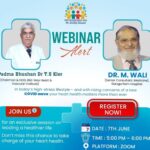- Although infections have come down to half, there is still a long way to go
- Strict adherence to ARTs can help slow the progress of this disease
New Delhi, September 12, 2017: As per recent statistics, new infections from HIV have almost halved in India over the past decade. However, this number is not enough to achieve the target of ‘ending AIDS’ globally by the year 2030. There were 2.1 million people living with HIV end of 2016. New infections fell to about 80,000 in 2016 from 150,000 in 2005.[1] There are still 2 million people living with HIV/AIDS, which is still quite a high number, feels the IMA.
HIV or the human immunodeficiency virus damages the immune system by destroying the white blood cells that fight infection. AIDS is the final stage of infection with HIV. However, not everyone with HIV develops AIDS. A person with HIV-AIDs stands the risk of acquiring serious ‘opportunistic’ infections and some cancers.
Speaking about this, Padma Shri Awardee Dr K K Aggarwal, National President Indian Medical Association (IMA) and President Heart Care Foundation of India (HCFI) and Dr RN Tandon – Honorary Secretary General IMA in a joint statement, said, “HIV spreads through unprotected sex with an infected person, sharing drug needles, or through contact with the blood of an infected person. Women can transfer the infection to their babies during pregnancy or childbirth. While there is no cure for AIDS, strict adherence to antiretroviral treatment can dramatically slow disease progression and prevent secondary infections and complications. Understanding the dynamics of transmission and putting more people on antiretroviral therapy can bring down the infection faster and help achieve the target set for the year 2030.”
Within 2 to 4 weeks after infection with HIV, a person can develop flu-like symptoms such as fever, chills, or rash. These last for few weeks post the infection. More severe symptoms such as profound and unexplained fatigue, rapid weight loss, frequent fevers, or profuse night sweats may not necessarily show up for about 10 years or more after the virus first enters the body.
Adding further, Dr Aggarwal, said, “HIV attacks and destroys the infection-fighting CD4 cells of the immune system and makes it difficult for the body to fight infections or various cancers. Without treatment, the immune system is gradually destroyed and the condition advances to AIDS. A blood test is the most accurate way to tell if someone is infected with HIV. Most tests for HIV/AIDS check for the presence of antibodies to the virus. If the result of an HIV/AIDS test is negative, this means the person tested is not infected or it is too early to detect the virus.”
The following tips can help prevent HIV infection.
- Get tested Talk to your partner about getting tested for the infection.
- Have safe intercourse HIV primarily spreads through anal or vaginal intercourse without a condom. Ensure you keep adequate protective measures in place. Use a condom correctly every time you have intercourse.
- Limit the number of sexual partners The more partners you have, the more likely you are to have a partner with HIV whose infection is not well controlled or a partner with a sexually transmitted disease (STD), which can increase your chances of acquiring the infection.
- Get tested for STDs Having an STD can increase your risk of becoming infected with HIV. Get tested and treated for any possible infections in time.
- Don’t share needles, syringes or other injecting equipment such as cotton, swabs. Use only sterile drug injection equipment and never share your injecting equipment with others.







